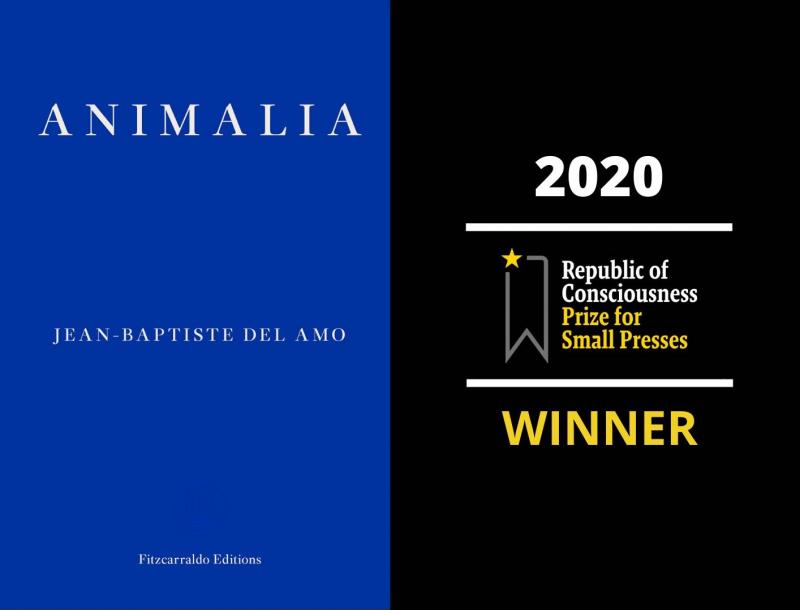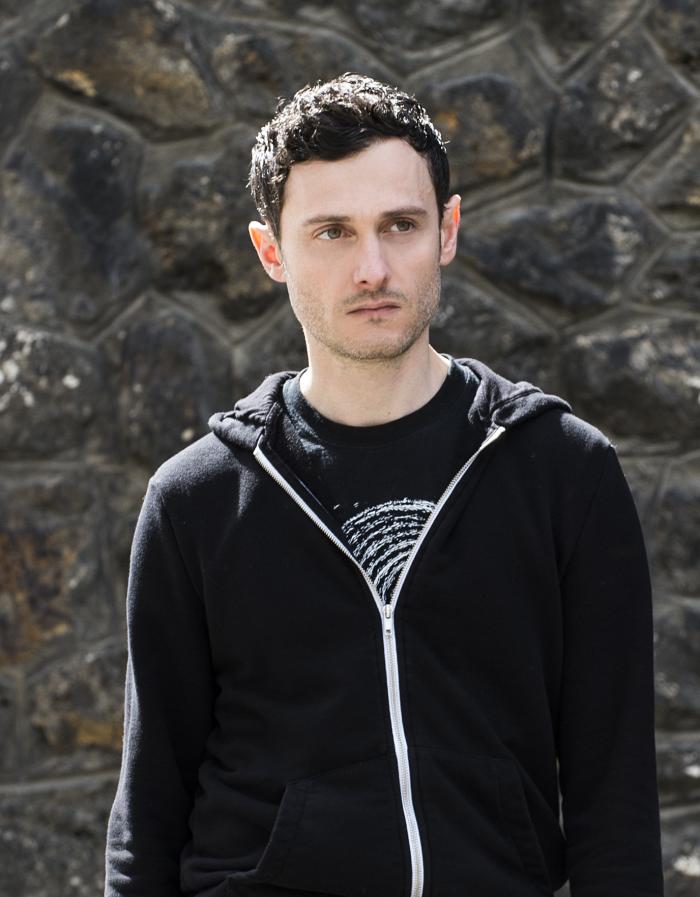Fitzcarraldo Editions wins Republic of Consciousness Prize | reviews, news & interviews
Fitzcarraldo Editions wins Republic of Consciousness Prize
Fitzcarraldo Editions wins Republic of Consciousness Prize
Jean-Baptiste Del Amo’s visceral tour de force scoops prize for outstanding fiction by a small press

South London-based publisher Fitzcarraldo Editions has once more been awarded the Republic of Consciousness Prize, confirming its status as a vital home for ambitious, edge-defining fiction. Now in its fifth year, the prize seeks to promote and reward the best in literary fiction from small presses in the UK and Ireland, which it defines broadly as publishers with fewer than five full-time employees.
Beginning on a deprived farm among the damp shadows of 1898, where the animate earth waits to swallow the ailing patriarch, Animalia is a book that specialises in filth and cruelty. Its sentences are thick with excrement, vomit, semen, mucus, blood and “faecal sludge”. From the excoriating years before the Great War to the horrors of 1914-17, and beyond to the brutal industrial-scale pig farming of the 1980s, Del Amo is interested in questioning the categories of “human” and “animal”, surveying the wreckage of human attempts to impose their will on the animal world – and on one other. From narrating a cow cranium being pulped to anatomising the “faecal magma” of a decomposing abdomen, the book is unsparing in its descriptions, creating a taxonomy of injury and physicality. Its darkness is of a “thick, aqueous” quality: it “seeps into [your] nostrils and fills [your lungs].”

Animalia becomes the first translated book to win the award. It is Del Amo’s fourth novel (his first won the prestigious Prix Goncourt), but the Fitzcarraldo edition marks his writing’s first appearance in English. “This kind of completely realised, dark and focused tonal masterpiece rarely finds its match in a translator,” remarked judge Sophie Lewis, herself a translator, “and at least as rarely, I imagine, finds the right publisher to take it on.”
Since 2014, Fitzcarraldo has made a name for itself in seeking out exceptional writing from the continent. Fellow judge Roland Gulliver applauded the small press’s judgement and movement against the grain: “Over the years, Fitzcarraldo Editions has repeatedly proven that what was deemed unfashionable and unsellable by the publishing industry was, in fact, the stuff of awards, prizes and Nobel winners: from short stories to essays to fiction in translation.” In Animalia, he continued, the small press realises another “rare reading experience”, “a vividly, painfully powerful novel that captures the life and strife of a working farm family through the generations, living a remote existence from humanity but in almost claustrophobic intensity with the natural and animal world."
Judge Sam Mills, writer and co-founder of indie press Dodo Ink, was likewise drawn to the simultaneous sweep and intricacy of the novel, “one of the best books I’ve read in some years”. “Within a few pages, I was enchanted by Del Amo’s prose style – its richness, inventiveness, lyricism, fluidity, strangeness… It is a book with so much scope, for it is a multi-generational epic, yet the author has such an eye for the little details of everyday life on the farm he weaves his plot around.”
Fitzcarraldo is the first press to manage the feat of winning the prize more than once. In 2017, the inaugural Republic of Consciousness was awarded for Counternarratives by John Keene, a roving collection of historical flash fiction and short stories. This year, while Fitzcarraldo takes the title, the £10,000 prize money is being shared equally among the shortlisted presses, in recognition of the “extremely difficult time” facing small businesses and freelancers during the lockdown. The shortlist includes the87press (Broken Jaw by Minoli Salgado), Dostoyevsky Wannabe (We Are Made of Diamond Stuff by Isabel Waider), Galley Beggar Press (Patience by Toby Litt) and And Other Stories (Love by Hanne Ørstavik, translated by Martin Aitken).
Founder Neil Griffiths, for the first time not part of the panel of judges, noted that “this year it was felt there could only be one winner”. “Given the current global situation,” he continued, “it is timely indeed to have a book that is preoccupied with our bodies as a physical organism. Covid-19 doesn’t care about our minds, our rationality, our creativity; it has no interest in us as human beings: it is virus that is transmitted from one animal to another animal. If the coronavirus levels us because we’re all susceptible, Animalia reminds us why.”
- Animalia by Jean-Baptiste Del Amo trans. Frank Wynne (Fitzcarraldo Editions, £12.99)
- Read more book reviews on theartsdesk
The future of Arts Journalism
You can stop theartsdesk.com closing!
We urgently need financing to survive. Our fundraising drive has thus far raised £49,000 but we need to reach £100,000 or we will be forced to close. Please contribute here: https://gofund.me/c3f6033d
And if you can forward this information to anyone who might assist, we’d be grateful.

Subscribe to theartsdesk.com
Thank you for continuing to read our work on theartsdesk.com. For unlimited access to every article in its entirety, including our archive of more than 15,000 pieces, we're asking for £5 per month or £40 per year. We feel it's a very good deal, and hope you do too.
To take a subscription now simply click here.
And if you're looking for that extra gift for a friend or family member, why not treat them to a theartsdesk.com gift subscription?
more Books
 'We are bowled over!' Thank you for your messages of love and support
Much-appreciated words of commendation from readers and the cultural community
'We are bowled over!' Thank you for your messages of love and support
Much-appreciated words of commendation from readers and the cultural community
 Natalia Ginzburg: The City and the House review - a dying art
Dick Davis renders this analogue love-letter in polyphonic English
Natalia Ginzburg: The City and the House review - a dying art
Dick Davis renders this analogue love-letter in polyphonic English
 Tom Raworth: Cancer review - truthfulness
A 'lost' book reconfirms Raworth’s legacy as one of the great lyric poets
Tom Raworth: Cancer review - truthfulness
A 'lost' book reconfirms Raworth’s legacy as one of the great lyric poets
 Ian Leslie: John and Paul - A Love Story in Songs review - help!
Ian Leslie loses himself in amateur psychology, and fatally misreads The Beatles
Ian Leslie: John and Paul - A Love Story in Songs review - help!
Ian Leslie loses himself in amateur psychology, and fatally misreads The Beatles
 Samuel Arbesman: The Magic of Code review - the spark ages
A wide-eyed take on our digital world can’t quite dispel the dangers
Samuel Arbesman: The Magic of Code review - the spark ages
A wide-eyed take on our digital world can’t quite dispel the dangers
 Zsuzsanna Gahse: Mountainish review - seeking refuge
Notes on danger and dialogue in the shadow of the Swiss Alps
Zsuzsanna Gahse: Mountainish review - seeking refuge
Notes on danger and dialogue in the shadow of the Swiss Alps
 Patrick McGilligan: Woody Allen - A Travesty of a Mockery of a Sham review - New York stories
Fair-minded Woody Allen biography covers all bases
Patrick McGilligan: Woody Allen - A Travesty of a Mockery of a Sham review - New York stories
Fair-minded Woody Allen biography covers all bases
 Howard Amos: Russia Starts Here review - East meets West, via the Pskov region
A journalist looks beyond borders in this searching account of the Russian mind
Howard Amos: Russia Starts Here review - East meets West, via the Pskov region
A journalist looks beyond borders in this searching account of the Russian mind
 Henry Gee: The Decline and Fall of the Human Empire - Why Our Species is on the Edge of Extinction review - survival instincts
A science writer looks to the stars for a way to dodge our impending doom
Henry Gee: The Decline and Fall of the Human Empire - Why Our Species is on the Edge of Extinction review - survival instincts
A science writer looks to the stars for a way to dodge our impending doom
 Jonathan Buckley: One Boat review - a shore thing
Buckley’s 13th novel is a powerful reflection on intimacy and grief
Jonathan Buckley: One Boat review - a shore thing
Buckley’s 13th novel is a powerful reflection on intimacy and grief
 Help to give theartsdesk a future!
Support our GoFundMe appeal
Help to give theartsdesk a future!
Support our GoFundMe appeal
 Jessica Duchen: Myra Hess - National Treasure review - well-told life of a pioneering musician
Biography of the groundbreaking British pianist who was a hero of the Blitz
Jessica Duchen: Myra Hess - National Treasure review - well-told life of a pioneering musician
Biography of the groundbreaking British pianist who was a hero of the Blitz

Add comment